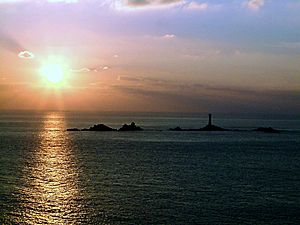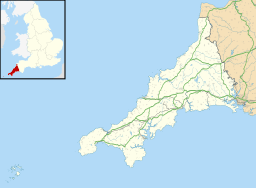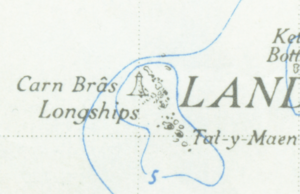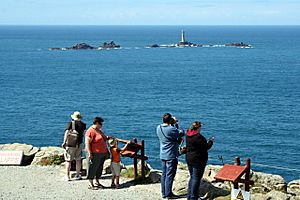Longships, Cornwall facts for kids
Quick facts for kids Longships |
|
|---|---|

A view of the Longships from the mainland
|
|
| Location | Cornwall, UK |
| Coordinates | 50°03′58″N 5°44′45″W / 50.0661°N 5.7458°W |
The Longships are a group of rocky islands. They are about 2 kilometers (1.25 miles) west of Land's End in Cornwall, United Kingdom. A famous Longships Lighthouse stands on these rocks. It first shone its light in December 1873.
Many people enjoy recreational diving around the Longships. The water here is very clear. It is also full of interesting sea creatures and plants.
Contents
Exploring the Longships' Geography
The Longships are located near the rocky area of Land's End. These rocks are made of granite. This granite formed deep underground a very long time ago. Scientists believe it happened between 268 and 275 million years ago. This was during a time called the Permian period.
Most of the Longships rocks disappear when the tide is high. But three larger islands always stay above the water. These are called Tal-y-Maen, Carn Bras, and Meinek. There are also two smaller rocks nearby. They are known as Kettle's Bottom. The Longships islands are part of the Sennen area.
What the Rock Names Mean
The names of the rocks in the Longships group come from the old Cornish language. Each name tells us something about the rock.
- Cein means back, ridge, or keel.
- Farkell Carn means forked rock-pile.
- Tal-y-maen means brow of the stones.
- Carn Bras means big rock-pile.
- Herly means long ledge.
- Plassek means foul one.
- Meinek means stony place.
Famous Shipwrecks Near the Longships
Many ships have been lost around Land's End and the Longships. Hundreds of shipwrecks are recorded. There are probably many more that we don't know about.
One of the earliest recorded shipwrecks near the Longships happened in 1532. A ship was lost, but its name is not known.
Other ships lost here include:
- 1898: The S.S. Bluejacket.
- 1901, November: The 'Mary James.' This ship was built in 1862. It often carried copper ore to Wales. It would then bring coal back for the mines. The 'Mary James' sank after its mast broke.
Images for kids
 | Shirley Ann Jackson |
 | Garett Morgan |
 | J. Ernest Wilkins Jr. |
 | Elijah McCoy |






